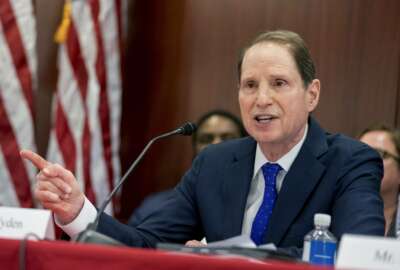To listen to the Federal Newscast on your phone or mobile device, subscribe in PodcastOne or Apple Podcasts. The best listening experience on desktop can be found using Chrome, Firefox or Safari.
- The Interior Department still hasn’t fully justified the reasons for the upcoming Bureau of Land Management move. The Government Accountability Office says Interior never gave detailed reasons for relocating specific BLM headquarters positions to Colorado or other western states. Employees didn’t have many chances to give feedback about the move. GAO says it’s tough to tell whether Interior and BLM are meeting their self-stated goals for the relocation. 252 BLM positions are supposed to move to Colorado, Arizona, Utah and six other states. (Government Accountability Office)
- The former Homeland Security Department acting inspector general, Charles Edwards, and a former co-worker are facing charges for allegedly stealing proprietary software and confidential databases and attempting to defraud the government. A federal grand jury returned a 16-count indictment against Edwards, and his former co-worker Murali Venkata. Edwards was the acting DHS IG from 2011 to 2013. They’re both charged with conspiracy to commit theft of government property and to defraud the U.S., theft of government property, wire fraud, and aggravated identity theft. (Department of Justice)
- More guidance for agencies on the coronavirus and telework from the Office of Personnel Management. OPM says agencies can order telework for all employees due to a potential coronavirus outbreak at the office. Telework-capable employees who aren’t sick are expected to work from home. Employees who can’t telework but must quarantine due to a potential coronavirus exposure will get paid weather and safety leave. Employees who become sick must use sick leave. Agencies can advance some additional leave if an employee runs out of sick time on a situational basis. (Chief Human Capital Officers Council)
- The largest federal employee union says all eligible federal workers should begin to telework now. The American Federation of Government Employees is urging the Office of Personnel Management to expand and invoke telework programs. Both the union and a group of Senate Democrats say previous OPM guidance on this topic is confusing and overly complex. Senators say employees need assurances that they won’t be asked to come to work while sick, and they’ll get paid for their time. (Federal News Network)
- Few federal organizations are unaffected by the corona virus outbreak. The Coast Guard transported seven Health and Human Services employees, and supplies, to the Grand Princess cruise ship off San Francisco. Texas Senator Ted Cruz, R-Texas, secluded himself at home for 14 days after coming into contact with an infected person at a Washington, D.C. conference. The Department of Veterans Affairs canceled a winter sports outing for some 1,000 disabled vets to have taken place at the end of March in Snowmass, Colorado.
- The military said it’s beginning its first testing of vaccines for the coronavirus. Top military medical officials said they are testing them in mice. The next step would be to test the vaccine in larger animals that are more similar to humans. Clinical trials might not take place for awhile, and the actual vaccine may not be ready for one year to 18 months. The Defense Department said it’s working with the Centers for Disease Control and Prevention, the National Institutes of Health, industry and academia to prevent, detect and treat coronavirus.
- The Defense Department confirms more service members are diagnosed with coronavirus. A Marine in Fort Belvoir, Virginia, and a sailor in Italy are the second and third service members to come down with the coronavirus. The Marine is being treated in an isolated room to ensure the safety of the other patients at Fort Belvoir Community Hospital. The sailor is restricted to residential quarantine and is under the care of the CDC and Italian health officials. Meanwhile, the Air Force canceled an event with small and nontraditional businesses in Texas scheduled for this week over concerns about the disease. (Virginia Department of Health)
- Two of the military’s top doctors say the Defense Health Agency may not be ready to run DoD’s medical facilities yet. The Air Force and Army surgeons general are telling Congress that moving military treatment facilities to one centralized agency is proving to be a difficult merger of cultures. DHA is supposed to take over all of the military hospitals and clinics within the next two years. Army Secretary Ryan McCarthy expressed concerns earlier this year about how quickly the transition was happening.
- There will be a new investigation into the Pentagon’s privatized housing contracts by the Defense Department Inspector General. Congress told the IG to probe the issue as part of the 2020 Defense authorization bill. IG officials said they plan to start questioning military service officials this month. The main focus will be on how well they’ve overseen the privatized housing initiative, which has been plagued by reports of poor living conditions in recent years. (Department of Defense)
- We now know why a federal judge ordered DoD to stop its work on the multi-billion dollar JEDI Cloud contract. New court documents reveal the reasons Judge Patricia Campbell Smith agreed to Amazon’s request for an injunction as part of its lawsuit. They have nothing to do with Amazon’s allegations that President Donald Trump influenced the contract improperly. Instead, the judge found Microsoft’s winning bid included an approach to data storage that shouldn’t have been allowed under the terms of the contract. The ruling is not the final word on JEDI. A judgement on whether to overturn the overall contract is expected to take several more months. (Federal News Network)
- Industry will have the chance to weigh in on how a long-awaited cyber policy change will impact a major IT modernization program. The General Services Administration wants to know if a new cyber policy to make it easier to move to the cloud and its governmentwide telecommunications modernization program can play nicely together. GSA released a request for information to vendors asking 10 questions about the new Trusted Internet Connections or TIC 3.0 policy and the Enterprise Infrastructure Solutions, or EIS, program. Among the topics GSA wants vendors to weigh in on are the advantages of buying TIC services through EIS and what changes are necessary to meet the new cyber requirements. The agency also gave the EIS vendors a sample solicitation to buy modernized network services with the new cybersecurity policy built in.
- With just over a month until the end of the tax filing season, the Treasury Inspector General for Tax Administration warns taxpayers to remain vigilant against scam calls. Since 2013, more than 2 million people have reported fraudsters impersonating IRS employees over the phone, and 15,000 victims have paid more than $80 million to these scams. Working with the Justice Department, TIGTA reports that 93 people have pleaded guilty to charges related to scam calls since 2013. (Department of the Treasury)
- The Taxpayer Advocate Service reports a spike in taxpayers seeking help. The IRS uses certain filters to detect and prevent tax refund fraud, but they also flag hundreds of thousands of legitimate tax returns. That’s led to the Taxpayer Advocate Service seeing a fivefold increase in the number of taxpayers seeking its help between 2017 and 2019. To handle this workload, acting National Taxpayer Advocate Bridget Roberts says her office will wait about four weeks before accepting most cases. That gives the IRS’ systemic data matching process time to work, and to clear some of the false positives.
Copyright
© 2025 Federal News Network. All rights reserved. This website is not intended for users located within the European Economic Area.




